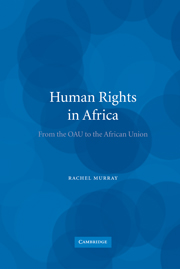Book contents
- Frontmatter
- Contents
- Acknowledgements
- List of abbreviations
- 1 Historical overview of human rights in the OAU/AU
- 2 The relationship between the OAU/AU and the African Commission on Human and Peoples' Rights
- 3 The link between human rights and democracy
- 4 The relationship between conflict and human rights
- 5 Women and the OAU/AU
- 6 Children's rights in the OAU/AU
- 7 Refugees and human rights
- 8 Development, NEPAD and human rights
- 9 Conclusion
- Appendix I Charter of the Organization of African Unity
- Appendix II Constitutive Act of the African Union
- Appendix III African Charter on Human and Peoples' Rights
- Bibliography
- Index
3 - The link between human rights and democracy
Published online by Cambridge University Press: 27 July 2009
- Frontmatter
- Contents
- Acknowledgements
- List of abbreviations
- 1 Historical overview of human rights in the OAU/AU
- 2 The relationship between the OAU/AU and the African Commission on Human and Peoples' Rights
- 3 The link between human rights and democracy
- 4 The relationship between conflict and human rights
- 5 Women and the OAU/AU
- 6 Children's rights in the OAU/AU
- 7 Refugees and human rights
- 8 Development, NEPAD and human rights
- 9 Conclusion
- Appendix I Charter of the Organization of African Unity
- Appendix II Constitutive Act of the African Union
- Appendix III African Charter on Human and Peoples' Rights
- Bibliography
- Index
Summary
Introduction
Democracy and human rights have historically been regarded as distinct phenomena occupying different areas of the political sphere: the one a matter of the organisation of government, the other a question of individual rights and their definition … Today this separation is no longer tenable, if indeed it ever was … the type of political system within a country is far from irrelevant to the standard of human rights its citizens enjoy.
The increasing importance since the end of the Cold War of linking the concept of democracy with human rights can be seen at the level of the UN, regionally and can be seen at the OAU. The fact that the OAU spent many years focusing on decolonisation as an aspect of self-determination, an issue which then became more or less obsolete, is also a factor that prompted it to expand such a concept to consideration of more internal issues. At the same time economic development was also becoming an issue for the OAU with the era of globalisation. As the former Secretary General of the OAU illustrated:
The issue of democratisation and good governance has been on the OAU's agenda for the last several years. In the process, we have endeavoured to promote these objectives within the limits of our resources and capacity. In this regard we have been encouraged by the growing recognition by our member states that the roots of economic development and political stability must be planted in good and responsive governance. […]
- Type
- Chapter
- Information
- Human Rights in AfricaFrom the OAU to the African Union, pp. 73 - 115Publisher: Cambridge University PressPrint publication year: 2004



